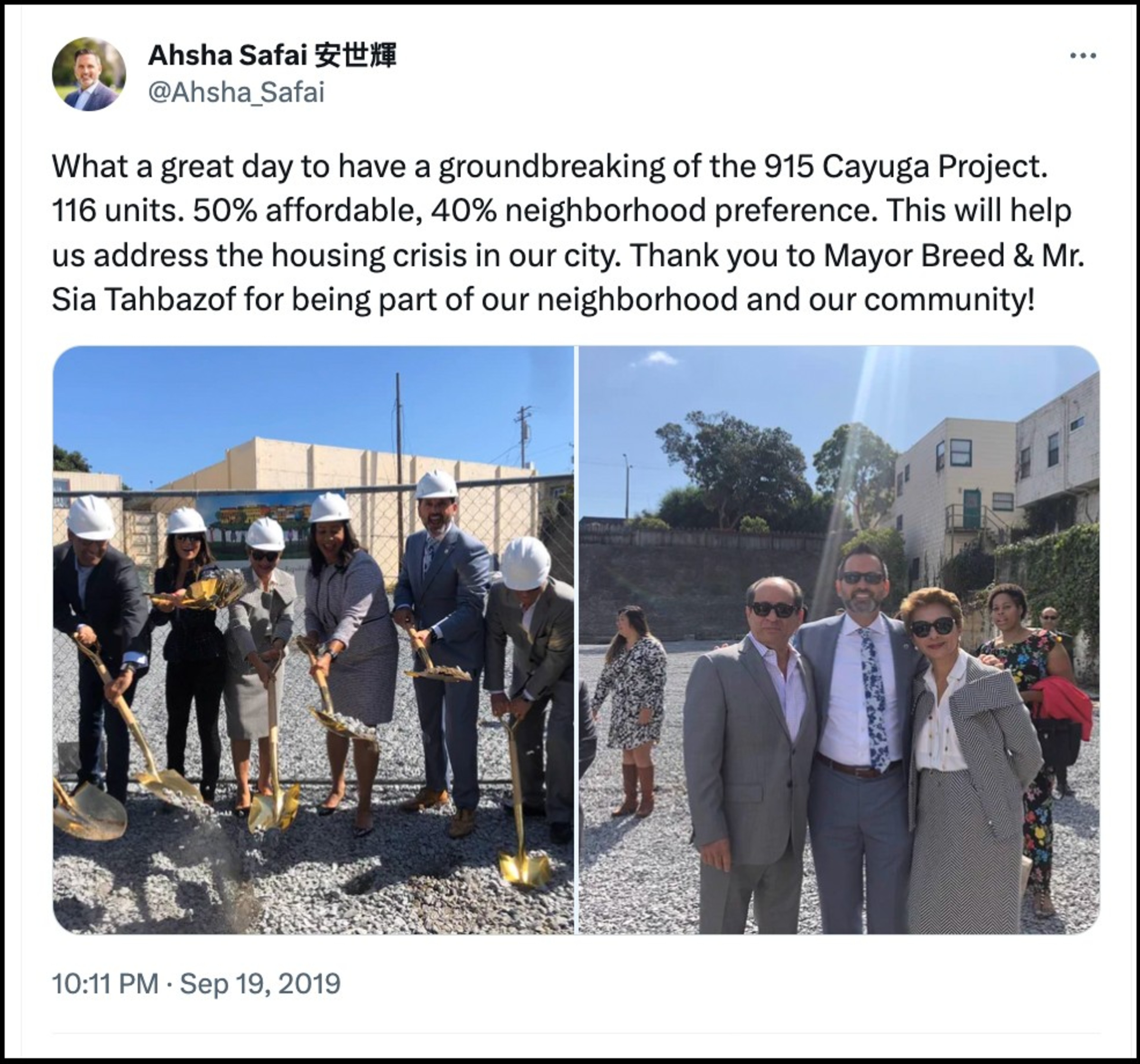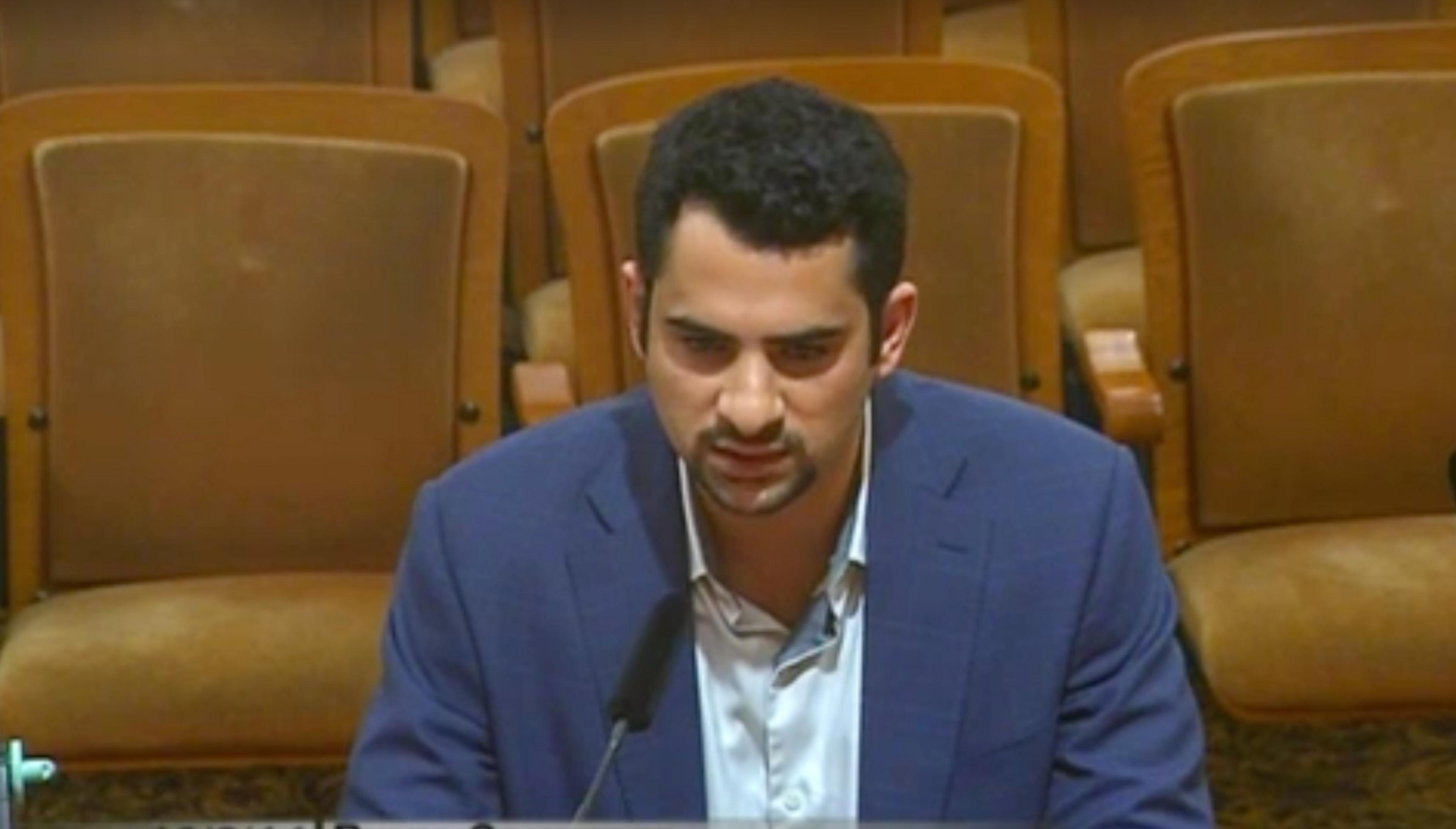When former San Francisco building inspector Bernie Curran was sentenced to prison last month for his role in the city’s wide-ranging corruption scandal, the federal prosecutor in his case teased a potentially significant development in the saga.
The prosecutor revealed that a prominent San Francisco real estate developer, referred to only as Developer-1 in court records from the Curran case, may also face criminal charges for his part in the elaborate scheme that earned Curran his prison sentence. Already, the scandal has taken down some of the most powerful officials in San Francisco and shed light on a culture of casual corruption within city government.
“This is Mr. Curran’s day in court,” Assistant U.S. Attorney Casey Boome said at the July 14 sentencing hearing. “Developer-1 will have his day in court, and he will be held accountable for his role in this scheme.”
The developer, who remains unnamed by the U.S. Attorney’s Office, routed a $260,000 loan to Curran through a series of transactions meant to conceal the source of the funding, federal prosecutors said in court records.
Curran, who pleaded guilty last December to two counts of accepting illegal payments, regularly inspected projects owned by the developer as a senior building inspector for the Department of Building Inspection. He admitted in his plea agreement that the developer never required him to pay back $30,000 of the loan in part because they were friends but also as a reward for him inspecting his projects, prosecutors said.
In at least one case, prosecutors said that Curran gave the developer “favorable official treatment” in 2018 by signing off on a key approval for a project that he shouldn’t have—just months after the developer forgave $30,000 of his debt.
It appears from court and other public records that Developer-1 may be Sia Tahbazof, a civil engineer and philanthropist.
Tahbazof, 72, is the patriarch of a family that owns, develops and manages properties in San Francisco through various companies. He co-founded a charity with his wife that gave away more than $400,000 last year (opens in new tab), federal tax filings show.

Tahbazof is also politically connected. He hosted a fundraiser for Mayor London Breed (opens in new tab) in 2018 and has described Supervisor Ahsha Safaí, who is running against Breed for mayor in 2024, as a family friend (opens in new tab).
In court filings, defense attorneys for Curran described Developer-1 as “immensely wealthy,” with “a minimum net worth of over $100 million” as of 2017. They said he first befriended Curran in the early 1990s and hired Curran’s daughter, Siofra Curran, to work in his office for a seven-year period extending into 2023.
Siofra Curran, 23, first worked at the Tahbazof Law Firm and, later, the Atlas Property Group over a seven-year period ending in April 2023, according to her LinkedIn profile (opens in new tab). Both companies are run by Tahbazof’s children, attorneys Yosef Tahbazof and Sufi Tahbazof Hariri, according to the website for the law firm and state business filings for the property management company.
“I have worked for the Tahbazof family for almost 7 years now,” Siofra Curran wrote in a January letter filed in court (opens in new tab) as part of her father’s case. “My father and Sia Tahbazof had been friends since before I was born and my father asked Sia if he would allow me to work part-time for them while I was in high school.”
Sia Tahbazof also appears to fit the description of Developer-1 in two other ways.
First, a mixed-use housing project at 750 Harrison St. that was owned by a company Sia Tahbazof founded and managed, SST Investments, received a key approval from Curran on a permit in 2018, according to property and building inspection records.
Federal prosecutors said a project owned by Developer-1 received the same approval from Curran on the same date and on the same block.

Second, attorneys for Curran described the “tortured chain” of transactions through which Curran received the loan from Developer-1. The chain began with a $300,000 check from Developer-1 to a relative and ended with a check to Curran.
Records from a separate state case filed by local prosecutors against Curran, obtained for the first time by The Standard, reveal a matching series of transactions. The chain began with a $300,000 check from SST Investments to Freydoon Ghassemzadeh and ended with a check to Curran.
Ghassemzadeh, 86, is the brother-in-law of Sia Tahbazof, according to social media posts and property records.
Sia Tahbazof declined to comment and hung up when reached by phone and asked about his relationship with Curran. He did not respond to subsequent inquiries offering him the opportunity to say he was not Developer-1.
The U.S. Attorney’s Office did not respond to questions about the identity of Developer-1. The office has not announced charges against Sia Tahbazof.
Both Siofra Curran and an attorney for Bernie Curran declined to comment.
From Iran to California
Sia Tahbazof fled Iran after the revolution and immigrated to San Francisco in 1981 (opens in new tab), according to an online biography written by his wife. He soon founded the design and engineering firm SIA Consulting and later the development company SST Investments.
His early work included recommending fixes for homes damaged by the massive Northridge earthquake in Los Angeles County in 1994 and flipping fixer-upper homes in San Francisco that he would remodel and sell himself, his wife wrote.
Tahbazof became a landlord when he decided to keep and rent some of those remodeled homes in the Bayview.
In the coming decades, Tahbazof helped many of his family members immigrate to the U.S. and mentored several of them in construction, according to the biography.

He ultimately retired and passed on the development company to his children, his wife said in the biography. However, Tahbazof has still been active in recent years.
In a client testimonial for now-failed First Republic Bank, Tahbazof was photographed sitting in an ornate chair surrounded by his family and interviewed on video.
“In my business, the respect, the integrity, is so important,” Tahhbazof said in the interview (opens in new tab). “And honestly, this is what I see at First Republic Bank.”
In 2022, Tahbazof celebrated the grand opening of what his wife described as a “monumental” affordable housing project they developed in San Francisco’s Excelsior neighborhood.

An ‘Elaborate Concealment Strategy’
In court records, federal prosecutors said Curran and Developer-1 hatched an “elaborate concealment strategy” to disguise the source of the loan. The strategy involved Curran signing a loan agreement with a relative of Developer-1 to establish the terms of what prosecutors called a “fictional loan.”
The Standard pieced together the following timeline from court filings by defense attorneys and prosecutors in the federal case, as well as court records filed by prosecutors in the state case that Curran is facing on perjury and conflict of interest charges.
It all started in early 2017, when Curran asked the developer for the loan because he needed money to refinance his home and lower his monthly mortgage.
While Developer-1 agreed to give Curran the money, prosecutors said Curran recognized that “accepting the money from Developer-1 would present a conflict of interest if Curran continued to inspect Developer-1’s properties.”
So the two men hid the payment by “routing the cash through several relatives, including Curran’s mother,” prosecutors said.
The first transaction described in state court records was a $300,000 check dated March 14, 2017, from SST Investments to Ghassemzadeh, Sia Tahbazof’s brother-in-law.
A day later, Sia Tahbazof’s son, Yosef Tahbazof, sent an email asking a financial services company to draft the terms of a $180,000 loan from Ghassemzadeh to Curran. Yosef Tahbazof is referred to by his first name and last initial in the filing and identified as an attorney for the Tahbazof Law Firm.
Yosef Tahbazof, who currently serves as a member of San Francisco’s Assessment Appeals Board, declined to comment and hung up when reached by phone. He did not respond to a subsequent email seeking comment.

The loan agreement was signed by Curran on March 21, 2017, along with a deed of trust giving Ghassemzadeh the right to sell Curran’s home to recover the $180,000, according to state court records as well as a copy of the deed.
Then, on March 22, 2017, a check for $260,000 from Ghassemzadeh and his wife was deposited into a bank account belonging to Curran’s mother, state court records show. The memo line read “loan.”
Attorneys for Curran in the federal case said the “tortured chain” of transactions was completed when Curran’s mother wrote a $260,000 check to Curran, deposited into his bank account on March 29, 2017. An identical check is reflected in state court records. Local prosecutors said the memo line read “gift.”
Curran began repaying the loan the same month he received it by dropping off cash at Developer-1’s office in San Francisco in sums of $30,000 to $40,000, his attorneys in the federal case said. They said Curran had the cash from his time working as a contractor and that his brother also helped him repay the loan.
State court records show an $80,000 check from his brother and sister-in-law was cut to Ghassemzadeh in January 2018. The memo line read “Repayment of Loan.”
About a year after giving Curran the loan, prosecutors said Developer-1 forgave the remaining $30,000 that Curran owed him in early 2018.
Defense attorneys said he told Curran, “Make sure I don’t get any jackasses,” which Curran “understood to reference overly strict building inspectors on Developer-1’s upcoming projects.”
But his attorneys characterized the statement as a “half-hearted request” and said Curran never interfered with any inspector working on the developer’s projects or approved a permit for the developer that “was not warranted.”
Federal prosecutors disagreed, saying they had evidence indicating Curran provided favorable treatment at properties owned by the developer.
A Quid Pro Quo?
On Aug. 17, 2018, Curran issued a Temporary Certificate of Occupancy (TCO) for a project owned by Developer-1 in the 700 block of Harrison Street in South of Market, the U.S. Attorney’s Office said in court records. He did so despite another building inspector having found several building code violations with the property that needed to be fixed before the approval could be granted.
The only TCO that Curran was recorded as issuing on that day was for a nine-story mixed-use building at 750 Harrison St., according to his former employer, the Department of Building Inspection. Before he issued the TCO, another inspector identified issues that needed correcting, such as improper door clearances and the height of thresholds, inspection records provided by the agency show.

The property was owned by SST Investments at the time Curran issued the TCO, property records show. SIA Consulting filed the paperwork requesting it, according to documents provided by the Department of Building Inspection.
A spokesperson for the agency said he could not confirm if the issues identified by the earlier inspector have been fixed. The department launched a review of all properties touched by Curran in response to the scandal and has yet to clear 750 Harrison St. as part of the audit, the spokesperson said.
Curran denied “wrongly interceding” in the project. Curran’s attorneys said he “remembers signing the TCO but only after all of the appropriate ‘signoffs’ had been completed.”
“This—as the government contends—is not an example of some type of quid pro quo being granted by Mr. Curran to Developer-1 in exchange for debt forgiveness,” Curran’s attorneys Philip Kearney and Thomas Mazzucco wrote in court filings.
A ‘Fictional Loan’
It wasn’t until May 2021, while Curran was under investigation by the City Attorney’s Office, that Curran updated his financial disclosure forms with the city to report that he had accepted a loan from Ghassemzadeh years earlier worth more than $100,000, according to copies of the forms reviewed by The Standard.
Without referring to Ghassemzadeh by name, federal prosecutors describe identical disclosure forms filed by Curran in which they say he “falsely” certified that money he received from Developer-1 was instead a loan from the developer’s relative.
Curran admitted to falsifying the disclosure form to deceive investigators and hide the fact that Developer-1 was the “source of the money,” federal prosecutors said.
They said that Curran had agreed to “sign and record a false loan agreement and deed of trust purporting to establish the terms of a fictional loan” with the relative.
The loan from Ghassemzadeh is now at the center of the state case against Curran filed by then-San Francisco District Attorney Chesa Boudin.
Curran approved a final inspection for a property owned by Ghassemzadeh at 708-710 Buchanan St. in San Francisco on Feb. 15, 2018, while the $180,000 loan was outstanding, state prosecutors said in court records.
Ghassemzadeh is among several property owners from whom Curran allegedly accepted payments while inspecting their properties, for which he is facing various misdemeanor conflict-of-interest charges. He is also facing felony perjury charges for allegedly failing to disclose the payments over the years.
Reached by phone, Ghassemzadeh declined to speak about the allegations. Prosecutors have not announced any charges against him.
“I am 86 years old,” Ghassemzadeh said. “I don’t remember. I can tell my lawyer to contact you.”
Curran was sentenced to a year and a day in federal prison July 14 after pleading guilty to two counts of accepting illegal reward payments.
A judge ordered him to surrender in October.
In state court, Curran has pleaded not guilty to the 11 counts against him and is due to appear at the Hall of Justice on Aug. 30.
